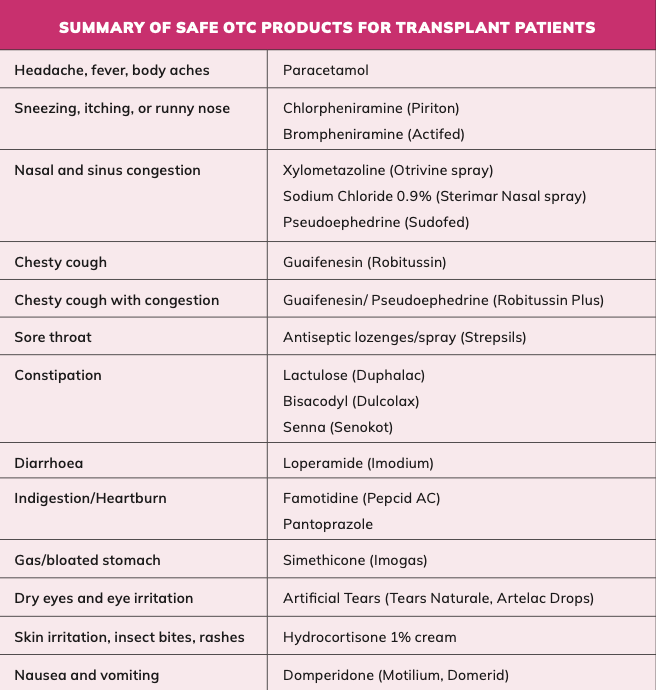Eamonn Brady MPSI examines the current range of kidney transplant medication advice and what to avoid
Our kidneys are situated at our lower back behind the stomach, one each side of the spinal cord, with the lower ribs acting as a cage for the kidneys, helping to prevent injury.
Each kidney is approximately the size of a person’s fist. The main role of the kidneys is to filter waste products and excess water from the blood; produce hormones to regulate blood pressure and red blood cell production; and maintain balance of water, salts, and acid.
Kidney failure
Kidney failure is usually caused by a condition that prevents the kidneys from functioning normally — including the likes of diabetes mellitus, high blood pressure, polycystic kidney disease, and glomerulonephritis.
Injury and birth defects can also cause kidney failure. Damage to the kidneys from a condition like diabetes can take years before the effects of kidney failure start to be noticed. A sudden loss of kidney function is rarer but can occur due to some conditions. Kidney failure causes problems like a build-up of waste products and fluids and can end up developing into side-effects like tiredness and fatigue, oedema (swelling) in ankles and face, nausea, and a poor appetite.
Benefits of kidney transplantation
Kidney transplants are not a cure, but they allow maintenance of a normal standard of living. A successful kidney transplant should mean a patient no longer needs dialysis, and fluid and diet restrictions end. Energy levels should increase as the new kidneys start producing red blood cells.
When should a recipient contact the transplant team?
- Temperature is 38.3oC or higher. Do not take temperature-reducing medication such as paracetamol until speaking to a member of the transplant team. Taking the likes of paracetamol to decrease temperature means the transplant team cannot determine the level of temperature increase, thus making possible rejection diagnosis more difficult.
- Weight increases by two-to-three pounds in one day, or five-to-seven pounds over three-to-five days.
- Urine output halves within a 24-hour period (ie, 2,000ml then 1,000ml 24 hours later).
- Changes to urine pattern, ie, pain or bleeding while urinating.
- Pain, swelling, tenderness, or drainage in the area of the new kidney.
- Nausea, vomiting, or diarrhoea.
- Cold or flu-like symptoms, ie, sore throat, fever, chills, etc (can be a sign of reaction to anti-transplant medication).
- Blood pressure is outside regular readings, or below 90/60 or greater than 170/110.
Dental procedures
Patients need to let a dentist know if they have had a kidney transplant. It is recommended to take an antibiotic before any dental work, including cleaning. Experts advise Amoxicillin 2g one hour before the dental procedure. If allergic to penicillin, Clindamycin (Dalacin C) 600mg one hour before the procedure may be used instead.
Medications to avoid
Some therapies interfere with the immunosuppressive medications. They can include meds for cold, allergy, cough syrup, or antibiotics. Antibiotics to avoid include clarithromycin (Klacid), erythromycin, and azithromycin (Zithromax). Other drugs to avoid include the antifungal fluconazole (Diflucan) and the heart rhythm drug diltiazem (Dilzem).
Avoid grapefruit or grapefruit juice when prescribed Neoral, Prograf, or Rapamune, as it changes the metabolism of these medications. Avoid magnesium oxide or antacids such as calcium carbonate, Rennies, Maalox, or Gaviscon within two hours of taking medications, as they may reduce absorption of some drugs such as immunosuppressants and antibiotics.
Some therapies interfere with the immunosuppressive medications. They can include meds for
cold, allergy, cough syrup, or antibiotics
Herbal preparations and supplements
There are very few scientific studies to indicate whether herbs are effective, safe, or interfere with prescribed medications. Herbs can cause serious interactions and kidney problems for patients with renal failure and those taking medications after a transplant. Possible issues with herbs are:
- Interactions between herbs and medications, which can include reducing the effectiveness of transplant rejection medication.
- Herbs may not be pure because of unregulated manufacturing procedures. Herbs come from plants that may cause bacterial, fungal, or parasitic infections. There have been reports of herbs containing pesticides and metals, including lead and mercury.
- Some herbs have toxic effects on the liver, kidneys, and heart, especially when taken with other medication, and can result in changes in blood pressure, blood sugar, and potassium levels, leading to risk of bleeding and transplant rejection.
- Dosages can vary from pill-to-pill, manufacturer-to-manufacturer, or from what is stated on the label.
To be safe, transplant patients should avoid herbal preparations.
More about transplant medication
Cyclosporin (Neoral)
Cyclosporin prevents the body rejecting the new kidney. It is available in 100mg and 25mg capsules. If a patient forgets to take a dose of Cyclosporin and it is less than six hours since the missed dose, they
can take the missed dose and go back to the normal schedule with the next dose. If it has been longer than six hours, skip that one dose and go back to normal schedule with the next dose. Never double-up a dose. If more than one dose is missed because of vomiting, inability to swallow, or any other reason, let the transplant team know immediately.
Possible side-effects with Cyclosporin include high blood pressure, hand tremors, tingling sensation in hands and feet, increased hair growth on face, and gum problems. Increased creatinine levels can occur due to high Cyclosporin blood levels.
Tacrolimus (Prograf)
Tacrolimus prevents the body rejecting the new kidney. This medication is available in 1mg (white), 5mg (pink) and 0.5mg (white) smaller capsules. It must be taken twice a day.
If a patient forgets to take a dose of Tacrolimus and it is less than six hours since the missed dose, take the missed dose and get back on schedule with the next dose. If it has been longer than six hours, skip that one dose and get back on schedule with the next one. Do not double-up. If more than one dose
is missed due to vomiting, inability to swallow, or any other reason, notify the transplant team immediately.
Some side-effects that have been reported with Tacrolimus are hand tremors, burning or tingling of the mouth, hand, or feet (this will likely improve as the dose is reduced), headaches, difficulty sleeping, high blood sugars, high blood pressure, nausea and/or vomiting (if this occurs, try taking with food), and an increase in creatinine.
Prednisolone (Deltacortril)
Prednisone is a steroid that prevents or treats rejection of the new kidney. The dose may be increased or decreased depending on response. High doses of Prednisone may be prescribed immediately after the transplant to prevent rejection, with the dose gradually reducing once the transplant is deemed successful. Prednisone may need to be taken long- term. It should be taken with food to prevent stomach irritation. If a patient forgets to take a dose of Prednisone, take the missed dose as soon as possible and get back on schedule with the next dose. Never double-up a dose. If more than one dose is missed due to vomiting, inability to swallow, or any other reason, let the transplant team know immediately.
Steroid dependency
The adrenal glands make a hormone called cortisol that is very similar to Prednisone and after a few weeks of taking prednisolone, the adrenal glands stop making this hormone. Prednisone should never be stopped abruptly; it should be gradually tapered-off slowly to give the adrenal glands a chance to start making cortisol again. Sudden withdrawal can cause severe fatigue, weakness, body aches, and joint pains, and possibly even cause life-threatening symptoms. Notify your doctor if taking steroids and carry a ‘steroid treatment card’ at all times. A steroid treatment card alerts any medic who treats a patient that they must keep administering steroids.
- Side-effects include:
- Stomach irritation;
- Blurred vision or disturbed eyesight. Long-term use gives risk of cataracts or glaucoma;
- Bone or joint pain, especially in hips;
- Raised blood pressure;
- Diabetes;
- Weight gain;
- Rounded, puffy face (called ‘moon face’);
- Acne;
- Insomnia;
- Low mood;
- Muscle weakness;
- Slow wound healing;
- Bruising;
- Stretch marks;
- Dry skin.
Sirolimus (Rapamune)
Sirolimus may be combined with other immunosuppressive medications to prevent organ rejection. If a dose of Sirolimus is forgotten, take the missed dose as soon as possible and get back on schedule with the next dose. Never double up a dose. If more than one dose is missed due to vomiting, inability to swallow, or any other reason, let the transplant team know immediately. Side-effects include:
- Headache;
- Swelling;
- Tremor;
- Insomnia;
- Diarrhoea, nausea, vomiting;
- Constipation and bloating;
- Low platelet count or anaemia;
- High or low potassium levels;
- Diabetes;
- Back or abdominal pain;
- Cough;
- Rash or acne;
- High cholesterol.
Blood counts (white blood cells, platelets, haemoglobin) need to be monitored while on sirolimus. It can cause anaemia (low red blood cells). If it does, the sirolimus dose will be lowered or held for a while and the patient may be prescribed erythropoietin (Aranesp). Erythropoietin is a naturally occurring hormone produced in the kidneys to produce red blood cells. Neupogen may be prescribed if neutrophils (a type of white blood cell) are low, as sirolimus can cause neutropaenia (low levels of neutrophils). Cholesterol levels can be increased by sirolimus, so a cholesterol- lowering medication (ie, a statin) may need to be prescribed.
Mycophenolate Mofetil (Cellcept)
Mycophenolate Mofetil (Cellcept) may be combined with other immunosuppressive medications to prevent organ rejection. Mycophenolate comes in 250mg capsules or 500mg tablets. It is usually taken two-to-four times a day and the usual total daily dose is 1,000-2,000mg.
If taking Mycophenolate four times a day and a dose is forgotten:
If less than two hours since the missed dose, take the missed dose and get back on schedule with the next dose. If it is close to the next dose, skip the missed dose and resume normal schedule.
If taking Mycophenolate twice a day and a dose is forgotten:
If it is less than six hours since the missed dose, take the missed dose and get back on schedule with the next dose. If more than six hours since missing dose, skip that dose and get back on schedule with the next dose. Never double-up a dose. If more than one dose is missed due to vomiting, inability to swallow, or any other reason, let the transplant team know immediately.
Side-effects include:
- Nausea and vomiting;
- Diarrhoea or constipation;
- Stomach pains and cramps;
- Low white blood cell count;
- Anaemia;
- High or low potassium levels;
- Tremor;
- Headache;
- Diabetes;
- Insomnia.
Blood counts (white blood count and haemoglobin) must be monitored regularly while taking Cellcept. If blood counts are less than the normal range, Cellcept may be lowered
or held. Neupogen will need to be prescribed to increase white cell count, or erythropoietin (Aranesp) will need to be prescribed to increase red cell count. Cholesterol levels can be increased by Cellcept so a cholesterol- lowering medication (ie, a statin) may need to be prescribed.
Prophylactic (preventative) medications
Immunosuppressants reduce the body’s ability to fight infections, meaning a patient may need to be prescribed medication to prevent infections while on immunosuppressants.
Co-trimoxazole (Septrin)
Septrin is an antibiotic used to prevent and/or treat pneumonia and other bacterial infections. Immunosuppressants increase the risk of pneumonia and other infections as they reduce the body’s ability to fight infections. Drink plenty of fluids while taking Septrin.
Side-effects include:
- Nausea;
- Rash;
- Itching;
- Increased risk of sunburn.
Valganciclovir (Valcyte), acyclovir (Zovirax), valacyclovir (Valtrex)
These antivirals are used for the treatment and prevention of viral infections, including cytomegalovirus (CMV), which is a type of herpes virus transmitted via bodily fluids. Valtrex is used to prevent or treat herpes simplex and shingles. Valtrex will not cure herpes virus completely, but it will reduce the pain and help heal the sores.
Valganciclovir (Valcyte) or acyclovir (Zovirax) are mainly used to treat and prevent CMV. Antivirals are usually prescribed for about three months after transplant. Men should take contraceptive precautions while taking these drugs due to the risks of birth defects.
Side-effects include:
- Headaches;
- Fever;
- Nausea and vomiting;
- Diarrhoea;
- Low blood counts;
- Insomnia.
Taking antivirals with food or milk will increase absorption and reduce stomach irritation. Blood counts must be monitored when taking antivirals and, if lower than expected, the anti-viral must be lowered or held. Antivirals should be avoided during pregnancy and women must not become pregnant for 90 days after finishing the antiviral course because of the risk of birth defects. Men should also use barrier contraception (condoms) during and for three months after the course of antivirals.
Diflucan (fluconazole) oral capsules or Mycostatin (nystatin) oral suspension Antifungal medication is used for the treatment and prevention of fungal infections of the mouth and throat. Antifungals usually need to be prescribed for about three months. Immunosuppressant medication increases the risk of fungal mouth infections and symptoms include mouth sores, white coating on tongue, or difficulty swallowing. Antifungal medication may need to be recommenced at different stages in the years after the transplant.
Antifungal medication may need to be recommenced at different stages
in the years after the transplant
Fluconazole and related antifungal medication can interact with some anti-rejection medications, so the doses of anti-rejection medications will need to be adjusted when starting and stopping antifungal medication. Topical Mycostatin oral suspension (nystatin) does not interact with the anti-rejection drugs in the same way.
Side-effects include:
- Nausea and vomiting;
- Diarrhoea;
- Mouth and throat irritation;
- Unpleasant taste.
Stomach protectants
Anti-rejection medication can irritate the stomach lining and bring on stomach ulcers.
A proton pump inhibitor (PPI) may be prescribed to reduce stomach acid and protect the stomach and prevent ulcers. PPIs used include lansoprazole, pantoprazole, omeprazole, rabeprazole, and esomeprazole.
Kidney rejection
Rejection occurs as the body recognises the transplanted kidney as a foreign object, thus the transplanted kidney is attacked by the body’s immune system. Rejection is possible even if all precautions are taken. It is reckoned that 50 per cent of kidney transplant patients will suffer at
least one rejection episode; however, a rejection episode does not mean the patient will lose the kidney. Swift action from the transplant team (ie, increasing immunosuppressant dose or changing to a different dose) will normally stop the rejection and save the kidney. This is why it is so important to recognise the symptoms of rejection, as getting quick treatment will save the kidney in most cases.
The first rejection episode occurs within six months of transplant surgery in most cases. Rejection may be chronic, meaning that it occurs slowly over a long period of time, or it can be acute, which means it occurs suddenly. The patient may feel perfectly well during a rejection episode, which is why it is important to have lab tests checked regularly. High laboratory results (blood, urea, nitrogen, and creatinine) can mean a rejection episode is occurring. An ultrasound or renal scan can help confirm a rejection episode and a kidney biopsy can act as a final confirmation.
Possible symptoms of a rejection episode:
- Temperature of 38.3oC or higher;
- Urine output halves, ie, if normal fluid intake is about 2,000ml per day and output reduces to 1,000ml. Urine output should roughly equal to fluid intake, so if drinking 2,000ml per 24-hour period, then urine output should also be about 2,000ml (though a 300 to 400ml difference is acceptable);
- Weight increases by five pounds or more within three days;
- Fluid retention, which can show as mild swelling of the face, feet, hands, ankles, and legs;
- If two blood pressure readings (taken at least one hour apart) are outside normal range or below 90/60 or above 170/100;
- Swelling or tenderness around the transplanted kidney;
- Raised Blood Urea Nitrogen (BUN) and creatinine.
How a rejection episode is reversed:
- Increasing prednisone dose;
- Intravenous (IV) steroids;
- Thymoglobulin or OKT3 (anti- rejection serum);
- Reducing Prograf or Neoral dose;
- Temporary dialysis may be required.
If a rejection occurs, return to dialysis will be necessary. The rejected kidney may remain in place unless fever, pain, swelling, vomiting, etc, occurs. If these symptoms occur, the rejected kidney may need to be removed surgically. Immunosuppressive medications will then be discontinued.
Kidney transplant patients: What OTC medication can be taken?
Medication to avoid
Some medications interfere with the immunosuppressive medications. They can include meds for cold, allergy, cough syrup, or antibiotics. I discussed some medicines to avoid earlier.
What OTC medication is safe?
Headache, fever, and body aches Paracetamol eases mild pain and fever and is safe for kidney transplant patients. The maximum daily dose of paracetamol is 4,000mg (8 x 500mg tablets).
Non-steroidal anti-inflammatory drugs (NSAIDs) must be avoided, as they can harm the kidneys and interact with some immunosuppressants. Ibuprofen is a common NSAID sold OTC. Aspirin is a relation of NSAIDs, so should also be avoided unless prescribed for medical reasons, ie, low- dose aspirin to prevent clots.
Sneezing, itching, and runny nose Antihistamines can be safely used by transplant patients. Loratadine (Clarityn) and cetirizine (Zirtek) are recommended, as they cause less drowsiness than other antihistamines. Chlorpheniramine (Piriton) is also safe to use but is best used at bedtime,
as it causes more drowsiness. Antihistamines should be used with caution for those with glaucoma, as they can increase pressure in the eye. They can also cause fluid retention, so are best avoided in those with an enlarged prostate or those experiencing trouble urinating. Sodium cromoglicate eye drops (Opticrom drops) are a safe option to prevent eye allergy symptoms. It works best if begun at least one week before contact with possible allergens.
Avoid combination (multi-symptom) cold, sinus, and flu products (Benylin Day and Night, Benylin 4 Flu, Nurofen Cold and Flu). Treat each symptom individually to avoid accidentally giving a drug that can cause kidney problems.
Nasal and sinus congestion
Topical nasal sprays are the safest for congestion problems. Topical decongestants such as xylometazoline (Otrivine and Sudofed nasal spray) should not be used for longer than three days because longer use can cause a rebound effect, making congestion worse.
Sodium chloride 0.9% or salt sprays, ie, Sterimar, can ease sinus systems by moistening sinus cavities and acting as a natural anti-inflammatory and they can safely be used long-term. Saline (salt) solutions are also available as nasal washes through various devices or bottles, ie, Neilmed Sinus Rinse.
Oral decongestants, such as pseudoephedrine (Sudafed tablets), should be used with care for transplant patients as they can raise blood pressure, which can put pressure on the kidneys. Decongestants are often present in many cough and cold remedies, so check the label before trying.
Sore throat
Most throat lozenges, ie, Strepsils, are safe to use and there are sugar-free versions for diabetics.
Chesty cough
Guaifenesin (Robitussin, Viscolex, or Exputex) is recommended for chest congestion. Drinking plenty of water can also help loosen chest congestion.
Dry cough
The cough suppressant dextromethorphan (Benylin Dry Cough) is safe to use — use the non- drowsy version during the day, as the night-time version has a sedative antihistamine called diphenhydramine added. Vicks VapoRub can help relieve a cough for a time. For diabetics, use a sugar-free version such as Robitussin Dry Cough Mixture.
Diarrhoea
Loperamide (Imodium) can be used for short-term relief of diarrhoea. Do not use for longer than 48 hours. For diarrhoea caused by infection, do not treat it with OTC products. If diarrhoea is heavy, bloody, or lasts for more than a day, it is important to get checked by a doctor.
Constipation
Products safe to use for transplant patients include bulk-forming products (Fybogel); stool softeners, such as docusate (Fletcher’s phosphate enema); stimulants such as bisacodyl (Dulcolax) or senna (Senokot), and osmotic laxatives such as lactulose (Duphalac) and macrogols (Movicol, Molaxole).
Do not use stimulant laxatives such as bisacodyl or senna long-term, as this will cause lazy bowel (which causes rebound constipation), prolonged
diarrhoea, and loss of important electrolytes (sodium, potassium, etc). Lactulose is a good option if a laxative is needed long-term, as it doesn’t cause long-term problems. If constipation last longer than 48 hours, see a doctor.
Indigestion and heartburn
Mild stomach upset can be eased with some OTC remedies such as antacids (ie, Rennies), famotidine (Pepcid AC), and pantoprazole. Avoid antacids or magnesium-containing products at the same time as immunosuppressants such as mycophenolate (Cellcept), tacrolimus (Prograf), or sirolimus (Rapamune), as they can reduce absorption of these drugs. Take OTC remedies such as antacids at least one hour before or two hours after the immunosuppressant. If loose stools, avoid magnesium containing products like Maalox, because magnesium can make diarrhoea worse, or worse again, they can cause magnesium levels to become too high, especially if kidneys are not functioning properly.
Gas
Simethicone (Imogas) is recommended for gas, which is a common cause of bloating.
Dry eyes and eye irritation
Artificial tear eye drops should be first choice for the symptoms of dry eyes and eye irritation. They replicate the role of natural tears. Drops are often
used during the day (ie, three times daily) and an ointment or gel is used
at night, as they are thicker and tend to last for longer while sleeping. There is no evidence that one brand is any more effective than the next. Examples include Tears Naturale and Artelac Drops. They should not be used for contact lens-associated irritation.
Nausea and vomiting
Domperidone (Motilium, Domerid) can be used to treat and prevent symptoms of nausea and vomiting, but should only be used short-term and at the lowest possible dose (maximum of

one 10mg tablet three times daily). See a doctor if nausea and vomiting lasts more than 24 hours, as it can be caused by prescription medication.
Skin irritation, insect bites, and poison ivy Topical corticosteroids, such as hydrocortisone 1% cream (Cortisol 1% cream), are safe to use for skin irritation, insect bites, and skin rashes. Use of corticosteroids should be short- term (no longer than seven days), as they can thin and mark the skin if used long-term.
Become a donor
Give the gift of life, become an organ donor today. For an organ donor card, contact the Irish Kidney Association on LoCall 1890 543639 or log on to www.ika.ie.
References Upon Request
Disclaimer: Brands mentioned in this article are meant as examples only and not meant as preference to other brands.
Written by Eamonn Brady (Pharmacist). Whelehans Pharmacies, 38 Pearse St and Clonmore, Mullingar. Tel 04493 34591 (Pearse St) or 04493 10266 (Clonmore). www.whelehans.ie







